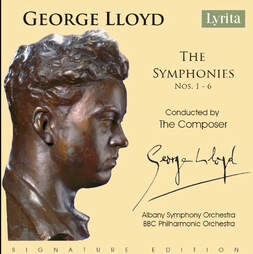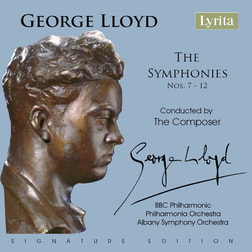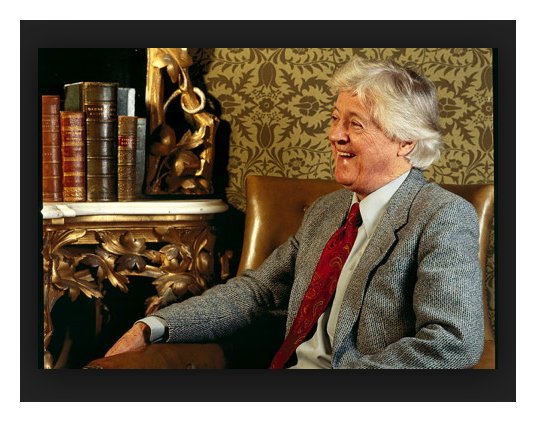The Trustees of Lyrita Nimbus Arts (LNA) have reached an exclusive agreement with The George Lloyd Society (GLS) to take over sale and hire of all George Lloyd’s scores held by the Society, as well as the commercial exploitation of the recordings made by the Society in the 1990s, conducted by the composer.
 George Lloyd (1913-98) is remembered mostly for his twelve symphonies; his compositions also include operas, choral works, concertos, piano and chamber music. LNA approached GLS with a proposal that involves the complete digitisation of George Lloyd's scores and his entire record archive represented in new compilations. Going beyond preservation, LNA's Trustees believe Lloyd’s music is ripe for rediscovery by concert managers and music lovers. His music, particularly the operas, won great praise and popularity before World War Two. When broadcasting and concert life changed direction in the 1960s, his style - dramatic, large-scale, richly orchestrated, unafraid of a big tune - fell out of favour. We believe that George Lloyd’s time has come again and will use the combined resources of the Lyrita Nimbus Arts charity and Lyrita label, together with the manufacturing, printing, publishing and distribution arms of Nimbus Records, to support this venture. William Lloyd was the composer’s business manager and executive producer; he has administered his record company and musical estate for the last twenty-five years. He writes: 'Our agreement with Lyrita Nimbus Arts is another milestone in the extraordinary story of George Lloyd and his music. The Lyrita label was responsible for issuing the first three commercial recordings of Lloyd’s symphonies over 40 years ago, and it is entirely fitting that Lyrita Nimbus will now take the complete catalogue of scores and recordings into the future. Lloyd was fiercely independent, and with the invaluable assistance of Albany Records USA, together with some of the best engineers and recording producers in the business and his loyal audience, he was able to maintain that independence from mainstream publishers and record companies. This allowed him to record over 20 albums under his own baton, and to publish his extensive catalogue under the imprint of the George Lloyd Music Library, but it came at a price. His commercial success was remarkable and was sufficient to finance all the recording and printing, but until now we have not had the international marketing reach, the in-house manufacturing and printing, and the digital distribution platforms which are required by the new global markets. This is a perfect match for us, and it is a great vindication of Lloyd’s faith in the enduring quality of his work that Lyrita have recognised its value and committed significant resources to bringing his music to a new audience.' Because George Lloyd’s personal attention is a dominating influence on the scores and recordings – which mostly he conducted himself – we have decided to headline this representation the ‘Signature Edition’. Scores will be cleaned, new orchestral parts created and recordings reorganised into affordable sets with new notes commissioned from Paul Conway. All digital platforms will have access to a unified and comprehensive offering from a single source. |
Stuart Millson, Quarterly Review, 29 February 2024
26 February 2024 (Symphones 1-6) and 22 March 2024 (Symphonies 7-12)
Jean-Yves Dupperon, Classical Music Sentinel, March 2024
Jonathan Woolf, MusicWeb International, 13 March 2024
Damian Thompson, The Spectator, 13 April 2024
The recordings are being released by Lyrita between March 2024 and February 2025:
www.lnarts.org www.lyrita.co.uk www.georgelloyd.com
Electronic press kits and pre-release listening links for reviewers are available from Ulysses Arts.
GEORGE LLOYD SIGNATURE EDITION AUDIO RELEASES

1 MARCH 2024
SRCD2417: Symphonies Volume 1
No. 1-6; Charade ‘Scenes from the ‘60s'
Overture John Socman
BBC Philharmonic Orchestra
Albany Symphony Orchestra
George Lloyd, conductor

5 APRIL 2024
SRCD 2418: Symphonies Volume 2
No. 7 - 12 (quadruple album)
BBC Philharmonic Orchestra
Philharmonia Orchestra
Albany Symphony Orchestra
George Lloyd, conductor

3 MAY 2024
SRCD 420: Requiem and Psalm 130
The Exon Singers
Stephen Wallace, countertenor
Jeffrey Makinson, organ
Matthew Owens, conductor

SRCD 2419: A Litany and A Symphony Mass
Janice Watson, soprano
Jeremy White, bass-baritone
Bournemouth Symphony Orchestra
Brighton Festival Chorus
Philharmonia Orchestra and Guildford Choral Society
George Lloyd, conductor

SRCD 2421: The Piano Concertos
No. 1 ‘Scapegoat’, 2, 3 and 4 (double album)
Martin Roscoe, piano
Kathryn Stott, piano
BBC Philharmonic Orchestra
London Symphony Orchestra
George Lloyd, conductor

SRCD2422: The Violin and 'Cello Concertos
(double album)
Violin Concerto No. 1 and No. 2
'Cello Concerto
Cristina Anghelescu, violin
Anthony Ross, 'cello
Philharmonia and Albany Symphony Orchestras
David Parry and David Alan Miller, conductors

SRCD 2423: The Piano Works: Solo and Duo: double album
The Lilly Leaf and The Grasshopper, The Transformation of that Naked Ape, An African Shrine, The Road through Samarkand, St. Antony and the Beggar, Intercom Baby. For two Pianos - Aubade, Eventide, The Road Through Samarkand.
Anthony Goldstone and Caroline Clemmow, piano duo
Kathryn Stott; Martin Roscoe

Royal Parks, Diversions on a Bass Theme, Evening Song, H.M.S. Trinidad March, English Heritage, A Miniature Tryptic
John Foster
Black Dyke Mills Band, conducted by David King
Equale Brass Quintet
SRMP 0105-0114:
Aubade | Eventide
Road Through Samarkand for Two Piano (and version for solo piano)
Lullaby | St. Anthony & the Beggar | The Agressive Fishes
The Lily-leaf the Grasshopper | The Transformation of that Naked Ape
An African Shrine
SRCD2426: John Socman (1951) - the complete opera (double album)
Using the composer’s suggestions, we presents the complete opera by combining the composer's studio recording of excerpts with a BBC broadcast recorded 'off-air' by Lyrita's founder Richard Itter.
SRCD0424: Lament for Violin & Piano, Air and Dance, Sonata for Violin & Piano, Seven extracts from The Serf.
SRCD2427: Iernin (1934) - the complete opera (triple album), recorded in 1985, conducted by the composer with the BBC Concert Orchestra and Marilyn Hill-Smith in the title role (triple album)
'One of the most successful operas written by a British composer'. The Musical Times
National prominence came with George Lloyd’s first opera, Iernin (1933-34), featuring a libretto by his father, William Lloyd. Based on a Cornish legend, the opera was premiered at The Pavilion, Penzance in November 1934, conducted by the composer. An endorsement by Frank Howes, music critic of The Times, led to Iernin being performed by the New English Opera Company at London’s Lyceum Theatre in June 1935. It was a sell- out for three weeks. The following year, whilst holidaying in Switzerland, George met Nancy Juvet. They married in January 1937. Nancy’s love and support throughout six decades of marriage was to prove pivotal to her husband’s continued creativity and indeed to his very survival.
Lloyd’s second opera, The Serf, was premiered by the English Opera Company at Covent Garden in London in 1938. William Lloyd supplied the libretto, setting the story in Yorkshire at the time of King Stephen. A review in The Stage newspaper described the opera as ‘full of promise for the future’. This prospect of even greater musical attainment was about to be shattered. When war broke out in September 1939, Lloyd joined the Royal Marines as a bandsman. In 1942 he served as a radio signaller on Arctic convoys to Murmansk on the cruiser HMS Trinidad. During one of these convoys the ship was struck by torpedoes, an oil tank ruptured and the transmitting station which Lloyd was helping to operate filled with oil. There were heavy casualties and he was almost drowned. He was mentally and physically traumatised to the extent that his doctors believed he would never recover. Nancy Lloyd refused to accept this verdict and slowly nursed her husband back to health.
Convalescing at Nancy’s lakeside home at Neuchatel, Switzerland, Lloyd began to write music again. The resulting Fourth and Fifth Symphonies (1946, 1948), among his finest works, were not performed at the time. After returning to England, he won an Arts Council commission to compose an opera for the Carl Rosa Company to tour around the country during the Festival of Britain in 1951. The ensuing stage work, John Socman, featured another libretto by his father, which told the story of a Wiltshire solider returning from Agincourt. The production, which premiered in Bristol in May 1951, was ruined by artistic differences between conductor and director. Shortly after this debacle Lloyd’s father died and George’s health collapsed again. George and Nancy Lloyd bought a small cottage at Folke in Dorset and began earning a living as market gardeners. After growing and selling carnations, they started mushroom farming. During these years of self- imposed exile, George composed for three hours before the working day. Consequently, when the Lloyds sold their smallholding in 1973 and returned to London, they brought with them a portfolio containing 20 years’ worth of scores.
A friendship with John Ogdon had far-reaching consequences. Lloyd assisted with the orchestration of the pianist-composer’s Piano Concerto and Ogdon recorded for EMI Lloyd’s piano piece African Shrine, shortly after premiering it in 1969. In the same year Ogdon took the score of Lloyd’s Eighth Symphony to the BBC and had it accepted. Eight years elapsed before it was broadcast. In the meantime, another of Lloyd’s champions, conductor Edward Downes, premièred the Eighth Symphony with the BBC Northern Symphony Orchestra, broadcast on Radio 3 in July 1977. In the succeeding five years, Downes tirelessly promoted and disseminated Lloyd’s music, including a performance with the BBC Philharmonic of the Sixth Symphony at the Proms in July 1981, the first appearance of the composer’s music at the celebrated summer music festival.
Inspired by his new-found popularity, Lloyd took up the baton himself. In 1986 he conducted the premiere of his Eleventh Symphony with the Albany Symphony Orchestra in New York. He also wrote his Twelfth Symphony for the orchestra. Other notable products of his glorious Indian summer of creativity include brass band piece Royal Parks, A Symphonic Mass and the 'Cello Concerto.
Having suffered heart problems for a year, George Lloyd died at University College Hospital, Marylebone, London, on 3 July 1998. A service was held a week later at Golders Green crematorium. His last work, the Requiem, written in memory of Diana, the Princess of Wales, was completed shortly before his death and premiered at the 2000 Oxford Contemporary Music Festival. Paul Conway, 2023
Trustees: Dr Richard Blackford, Adrian Farmer, Lynda Farmer, Charlotte de Rothschild, Antony Smith






